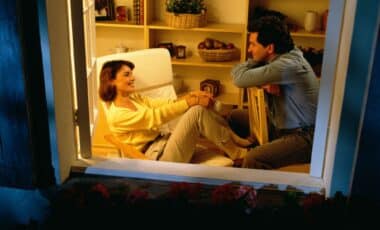Thom Sirisant
The hobby shared by Universal Music Thailand’s managing director Paul Sirisant (38), also known as Paulie, and his father Thom Sirisant (72), is an adventurous one. Tracing back to his childhood, Paulie recalls how his love for the ocean is intertwined with his father. “When he was flying for Thai Airways, during his layovers my dad would think of the things that he wanted to do and that was when he started dabbling in property. He bought his first seaside home in Bang Saray, Sattahip. It was situated near a fishing community and from my early childhood we would be down at the beach almost every weekend,” Paulie smiles. “My young memories revolved around being by the sea. I learned to be part of nature—I loved running in the rain and catching frogs,” he laughs.

Paul Sirisant
When Paulie was around eight years old, his father began teaching him and his brother, Prom, to sail. “As long as I can remember, we’ve done boating activities of some sort. Learning to sail is like learning to ride a bike. Most importantly, dad was very patient and taught us not to fear the sea but to understand it,” Paulie explains. “He would teach us how to gauge the velocity and direction of the wind and how to read the waves—just like the fishermen. It’s fundamental that you learn to understand the wind and respect the sea, because when you are out there sailing or windsurfing you’re at the mercy of the ocean. When I was eight dad took me out on a twin-hull Hobie Cat and deliberately capsized it in the middle of the ocean to teach me how to deal with an emergency.”
Now that his father is retired, Paulie says that Thom spends more time with his boats. “We have one big trip a year, which we prepare for days in advance. This isn’t pleasure cruising with a bottle of wine—it is serious sailing using skills and an acquired understanding of how the vessel performs in certain conditions to get the most out of your time on the water. It’s a great shared experience, very satisfying and lots of fun.”

Thom with his grandson Quinn
Now a father himself, Paulie continues the family’s close relationship with the sea by taking his toddler son Quinn to the coast as often as possible. As with his time with his own father, he values the opportunity to bond with his son. “When you’re out there on the sea on these trips, it’s a different kind of bonding. You’re away from everything else; you can focus on each other, talk properly and really connect. I’d say you never have a bad day on a boat. You can have a difficult day, and we’ve been in difficult situations during bad weather, but you relish the challenge together. For our family there’s nothing quite like it. Going on our sailing trips together—it’s very valuable to me.”
2. Chailadol & Boonchai Chokwatana

Chailadol and Boonchai Chokwatana
Chailadol Chokwatana (40), or Munk, is president of Munk Production and a director at Far East DDB advertising and marketing company. He is also a corporate identity adviser for Saha Patanapibul, of which his father, Boonchai (71), is chairman. “I remember well how my father always tried to make time for me and my sister, despite his busy work schedule,” Munk explains. “He would think nothing of staying up until 2am in the morning giving me advice, even though he had to wake up at 6am for work the next day.”
Says Munk, “We are both into cars. To be honest, we have many shared interests, but in the sense that we are interested in different areas of the same subject. For example, I like cars but I’m not that interested in the mechanical side, while dad is obsessed with fixing engines and the technical side of things. He likes to buy good quality second-hand cars and we enjoy searching for them together. He values my opinion and I enjoy watching him drive a hard bargain—it is a lesson in business. There have been occasions where I’ve wanted a particular car and I’ve had to cajole the old man into thinking it would be a good investment. Sometimes it works, sometimes it doesn’t,” he chuckles. “When I want a certain car, for instance the Lamborghini we currently own, I have to plan out an argument for it with the pros and cons and then talk to my dad into it.”
Does the pair ever disagree over the cars they buy? Munk smiles, “Dad likes to modify his own cars and go on test drives. When I was younger, I loved being taken along on these rides—sitting in classic cars such as a Ferrari or a Rolls Royce. I recall the vehicles breaking down sometimes—on one memorable occasion in the middle of a bridge. Sometimes parts would fall off them. There was also an occasion where I took out a car that my father had been working on and found that I couldn’t turn the steering wheel, which lent an interesting dimension to the driving experience, as did a jammed accelerator on one of his old Mercedeses. It’s a wonder I’m still here really! I laugh, but in fact dad is an excellent mechanic.”
Munk adds, “When my father is interested in something, he becomes really invested in it. For instance, he also collects guns and has them by the hundred. Then there was a period when he got into koi carp and suddenly four large ponds full of the fish appeared in the garden. We share a passion for collecting but unlike dad, my hobbies don’t require much investment—although he says I have far too many camera lenses while I argue that he has far too many guns.”
3. Pana & Nat Yontararak

Pana and Nat Yontararak
The Yontararak father and son duo are a force to be reckoned with in the musical scene. Pana (34) and dad Nat (64), a Silpathorn and Steinway artist, share a multi-faceted relationship as a father and son, teacher and student and musical colleagues.
“Our relationship is quite unique. It’s always been more than ‘daddy playing with his little son’”, says Pana. “As a father he helps to overlook my lectures at King Mongkut’s Institute of Technology, Ladkrabang. We chat about what I’m lecturing on and sometimes he’ll gives suggestions on what I can add to make it better. As a teacher, he can be tough, obviously.”
A highly regarded pianist, Nat also taught Pana the piano. “He’s very meticulous with details, especially when the student starts to reach quite a high level. As my boss at Nat Studio Music School, he instructs me on how to be a good teacher. He emphasises that it is important to inspire young learners with the aim of drawing out their talent.”

Today Pana often plays for Sunday church services and Nat isn’t short of advice. “Back when my dad was my age, every Saturday night before he headed off to play at church on the Sunday my grandmother [he indicates a framed picture of a lady smiling down from the wall] would ask him to play for her, and she didn’t tolerate any mistakes,” he laughs. “It’s actually our belief, that when we have a calling, in this case, a talent for music, then we have to give back to society.”
With Pana the tradition has continued. “So now it is my turn to play to my father on Saturday nights and his opportunity to critique me. He says things like ‘you’re rushing too much here’ or ‘when you play for the congregation you have to wait for them a little, sing with them and play at the same time’ and so forth,” Pana laughs. “Dad is also a composer and an arranger and he would come to my room out of the blue and drag me to the piano so he could play whatever he was working on and ask for my opinion.”
(Related: Hitting The Right Note: Nat Yontararak)
Pana has also played his father’s compositions—an experience he found to be both exciting and challenging. “I played one of dad’s sonatas last year. It was a 37-minute piece that he’d composed for the occasion of the late king’s golden jubilee. He told me that as a composer he has to be even more meticulous than when he teaches. Because he’s the composer, he knows every single detail of the work and exactly what he wants. He told me that a musician should be able to tell how a piece is meant to be played through the composer’s background and historical context. Playing his sonata was very challenging for me. The first time I heard the piece was when I was around 10 years old, when dad premiered it. It was later used to accompany the ballet Matanapata by Thanpuying Varaporn Pramoj with my dad playing it live for three days in a row. In 1997 I said to myself, ‘I’m going to play that piece one day’. In 2004, before I left to study abroad, I asked for the score. Dad said if I could play it one day, he would be very proud.”
That day came in 2017, when Pana performed at a memorial event for the late monarch. “Learning the piece with him was tough and it took a while as we were using my father’s handwritten score—but it was so worth it.”
4. Prabda and Suthichai Yoon

Suthichai Yoon
“When I was young I remember that my father was very busy because he was in the process of establishing The Nation newspaper with his brother Thepchai,” says 45-year-old Pradba. “I was born in 1973—it was a time of political turmoil in Thailand and so it was a period when there were many uncertainties. So my dad was very preoccupied and I didn’t feel very close to him because he spent so much time at work. I would get to see him once a week on Sundays when he would be home. I was closer to my mother back then. My dad and I did talk but as a man from a traditional Chinese family he could appear to be quite distant and strict from a child’s perspective.”
However, this did not mean that Prabda felt isolated from his father. Like a big tree that sustains multiple branches, the family and Prabda were connected to the patriarch. “Life within the household is all connected to dad. If we are doing some activity, going out for dinner or going on an upcountry trip, he’s the man with the plan and I like to go along with him.” During his childhood, Prabda and his father would often take trips to Pattaya and Hat Yai to mark qing ming or the traditional Chinese ancestor’s day.

Prabda Yoon
“I think as I have grown up, I have become closer to my father,” says Prabda. “He wasn’t so good at interacting with children but now that I am older we can discuss topics as adults and that has definitely helped to create a bond. We still only meet once a week,” he laughs, “but now we have lots to talk about. We discuss politics and news, life, family and society.” Plenty of scope then to argue about what’s going on in the world. “My parents are quite open in terms of the way they think, they’re not radical and they listen to my opinions. If they share a different perspective to mine on a certain matter, they don’t try to dictate how I should think or what I should believe.”
Now that Suthichai is retired he is busier than ever. “Dad never stops,” Prabda smiles. “He hosts a couple of television programmes and has become a dab-hand at Facebook. Given that he was so active in his professional life, this does not surprise me—he needs to feel busy.”
(Relevant: Society Bookworms Part 1 of 5: Prabda Yoon)
While both father and son pour their hearts into their work, they are very different. “It’s not like I have a better work-life balance than my father, it’s just that my work is mostly artistic and I can give myself more flexible deadlines. For instance, writing a novel or directing a film—they are self-contained projects and once completed it is time to move on to the next challenge. That is different to dad’s work in which topics and events are much more fluid, much more fast-moving and with many different variables. His schedule is far tighter than mine. Whereas I am busy during a project but then have a quiet period in which to plan my next undertaking, his work is always ongoing.”
Does Prabda regret that he and his father don’t spend that much time together, even now? “Actually I’m thankful that my father is who he is. From a young age I have enjoyed the freedom to grow independently and it has shaped who I am today. It has worked out well in our family. I would feel uncomfortable if I had to report everything to my parents or get my father’s permission before I did something.”
(Related: 5 Thailand Tatler Mother-Daughter Duos)







